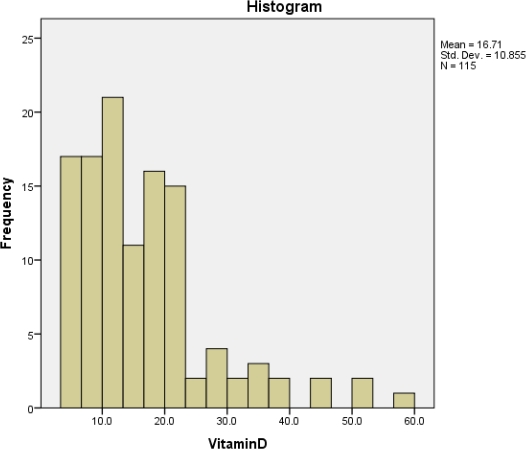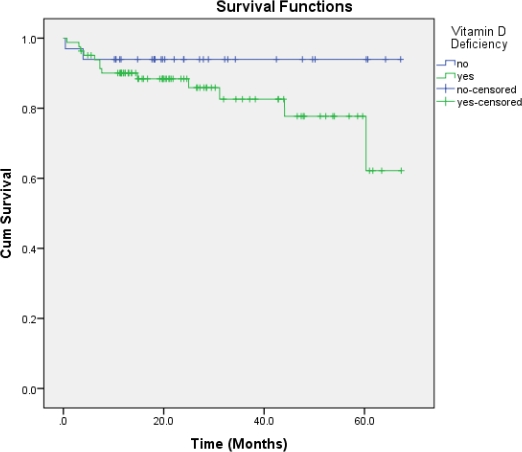Vitamin D Deficiency in Liver Transplant Recipients: Prevalence, Risk Factors, and Outcomes
Medicine, Icahn School of Medicine at Mount Sinai, New York, NY.
Meeting: 2015 American Transplant Congress
Abstract number: C137
Keywords: Liver transplantation, Outcome, Risk factors
Session Information
Session Name: Poster Session C: Liver Retransplantation and Other Complications
Session Type: Poster Session
Date: Monday, May 4, 2015
Session Time: 5:30pm-6:30pm
 Presentation Time: 5:30pm-6:30pm
Presentation Time: 5:30pm-6:30pm
Location: Exhibit Hall E
Vitamin D is known to be immunomodulatory, and its deficiency is associated with multiple chronic health problems in the general population. The objective of this study was to estimate the prevalence of vitamin D deficiency in liver transplant recipients and to identify factors associated with vitamin D deficiency in this cohort. Among 455 adult single organ-liver transplant recipients at our institution between January 01, 2009 and December 31, 2013, 115 liver transplant recipients had 25(OH)D concentrations measured within 3 months before (n=47) or after (n=68) liver transplantation. Vitamin D deficiency (25[OH]D<20ng/dL) was present in 82/115 (71.3%) of patients. The median 25(OH)D concentration was 13.8 ng/dL (IQR 9.5-21.0 ng/dL).  25(OH)D concentrations did not differ by sex or time of testing (pre/post tx), but were higher in Caucasian recipients compared to those of other races (17.0 [12.0-23.0] vs 11.0 [9.0-20.0] ng/dL, p<0.01), higher among those patients on supplements containing vitamin D (17.8 [12.0-23.7] vs 12.0 [9.2-19.9] ng/dL, p=0.02), and lower in diabetics vs non-diabetics (11.8 ng/dL [8.9-19.2] vs 16.0 [9.9-22.0] ng/dL, p=0.07). Those recipients who experienced an acute rejection during the follow-up period (median f/u 21.2 months, IQR: 12.9-38.3 months) had lower 25(OH)D concentrations at transplantation (10.5 [5.4-20.4] vs 14.0 [9.8-21.5] ng/dL), although this difference did not reach statistical significance(p=0.18). There was a trend towards increased mortality among vitamin D-deficient patients, although this did not reach statistical significance (p=0.15 log-rank test).
25(OH)D concentrations did not differ by sex or time of testing (pre/post tx), but were higher in Caucasian recipients compared to those of other races (17.0 [12.0-23.0] vs 11.0 [9.0-20.0] ng/dL, p<0.01), higher among those patients on supplements containing vitamin D (17.8 [12.0-23.7] vs 12.0 [9.2-19.9] ng/dL, p=0.02), and lower in diabetics vs non-diabetics (11.8 ng/dL [8.9-19.2] vs 16.0 [9.9-22.0] ng/dL, p=0.07). Those recipients who experienced an acute rejection during the follow-up period (median f/u 21.2 months, IQR: 12.9-38.3 months) had lower 25(OH)D concentrations at transplantation (10.5 [5.4-20.4] vs 14.0 [9.8-21.5] ng/dL), although this difference did not reach statistical significance(p=0.18). There was a trend towards increased mortality among vitamin D-deficient patients, although this did not reach statistical significance (p=0.15 log-rank test).  In conclusion, vitamin D deficiency is common among liver transplant recipients and may be associated with decreased survival. Further studies are required to examine the impact of vitamin D deficiency and supplementation on outcomes in this population.
In conclusion, vitamin D deficiency is common among liver transplant recipients and may be associated with decreased survival. Further studies are required to examine the impact of vitamin D deficiency and supplementation on outcomes in this population.
To cite this abstract in AMA style:
Joson T, Schiano T, Mehrotra A. Vitamin D Deficiency in Liver Transplant Recipients: Prevalence, Risk Factors, and Outcomes [abstract]. Am J Transplant. 2015; 15 (suppl 3). https://atcmeetingabstracts.com/abstract/vitamin-d-deficiency-in-liver-transplant-recipients-prevalence-risk-factors-and-outcomes/. Accessed February 15, 2026.« Back to 2015 American Transplant Congress
